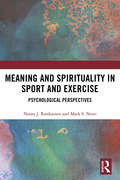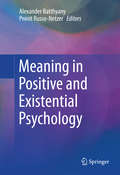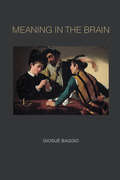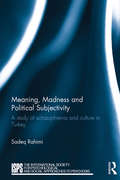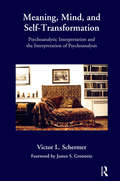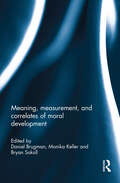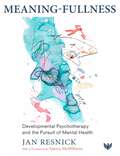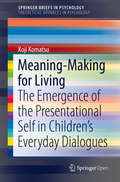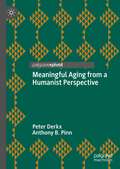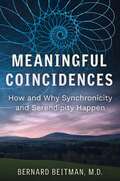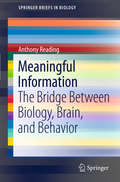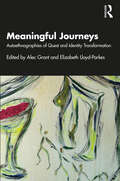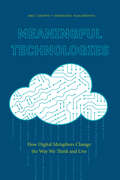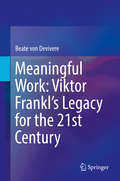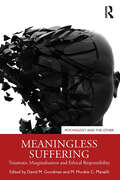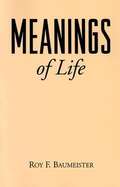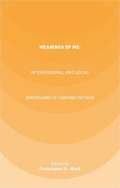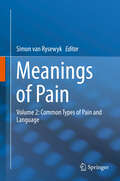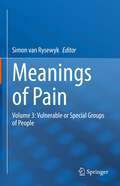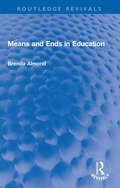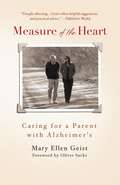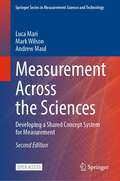- Table View
- List View
Meaning and Spirituality in Sport and Exercise: Psychological Perspectives (Routledge Research in Sport, Culture and Society)
by Noora J Ronkainen Mark S NestiDespite the growing literature on spirituality and its positive impact on well-being in health psychology, education, occupational psychology and leisure studies, it has been less examined in sport studies. Meaning and Spirituality in Sport and Exercise: Psychological Perspectives examines the many forms of spirituality in sport from a psychological perspective, from moments of transcendence and finding deeper meaning and value to prayer before an important competition or in adversity, such as a career-threatening injury. Based on the latest research and the Nesti’s experience in applied sport psychology service delivery, this book covers a range of novel topics linking spirituality to athlete development, injury, exercise motivation, and ageing athletes, and offers applied, practical guidance for sport psychologists working with spiritual athletes. Offering a unique contribution to the study of spirituality in sport, and to sport psychology practice, this book is vital reading for any upper-level student or academic working in sport and exercise psychology, religion and sport, or the philosophy of sport, and any practising sport psychologist.
Meaning in Positive and Existential Psychology
by Alexander Batthyany Pninit Russo-NetzerThis book is a first attempt to combine insights from the two perspectives with regard to the question of meaning by examining a collection of theoretical and empirical works This volume therefore is destined to become an important addition to psychological literature: both from the viewpoint of the history of ideas (again this would be one of the first times that positive and existentialist psychologies meet) and from the viewpoint of theoretical and empirical research into the meaning concept in psychology.
Meaning in the Brain (The\mit Press Ser.)
by Giosue BaggioAn argument that the meaning of written or auditory linguistic signals is not derived from the input but results from the brain's internal construction process.When we read a text or listen to speech, meaning seems to be given to us instantaneously, as if it were part of the input. In Meaning in the Brain, Giosuè Baggio explains that this is an illusion created by the tremendous speed at which sensory systems and systems for meaning and grammar operate in the brain. Meaning, Baggio argues, is not derived from input but results from the brain's internal construction process. With this book, Baggio offers the first integrated, multilevel theory of semantics in the brain, describing how meaning is generated during language comprehension, production, and acquisition. Baggio's theory draws on recent advances in formal semantics and pragmatics, including vector-space semantics, discourse representation theory, and signaling game theory. It is designed to explain a growing body of experimental results on semantic processing that have accumulated in the absence of a unifying theory since the introduction of electrophysiology and neuroimaging methods.Baggio argues that there is evidence for the existence of three semantic systems in the brain—relational semantics, interpretive semantics, and evolutionary semantics—and he discusses each in turn, developing neural theories of meaning for all three. Moreover, in the course of his argument, Baggio addresses several long-standing issues in the neuroscience of language, including the role of compositionality as a principle of meaning construction in the brain, the role of sensory-motor processes in language comprehension, and the neural and evolutionary links among meaning, consciousness, sociality, and action.
Meaning, Discourse and Society
by Wolfgang TeubertMeaning, Discourse and Society investigates the construction of reality within discourse. When people talk about things such as language, the mind, globalisation or weeds, they are less discussing the outside world than objects they have created collaboratively by talking about them. Wolfgang Teubert shows that meaning cannot be found in mental concepts or neural activity, as implied by the cognitive sciences. He argues instead that meaning is negotiated and knowledge is created by symbolic interaction, thus taking language as a social, rather than a mental, phenomenon. Discourses, Teubert contends, can be viewed as collective minds, enabling the members of discourse communities to make sense of themselves and of the world around them. By taking an active stance in constructing the reality they share, people thus can take part in moulding the world in accordance with their perceived needs.
Meaning, Madness and Political Subjectivity: A study of schizophrenia and culture in Turkey (The International Society for Psychological and Social Approaches to Psychosis Book Series)
by Sadeq RahimiThis book explores the relationship between subjective experience and the cultural, political and historical paradigms in which the individual is embedded. Providing a deep analysis of three compelling case studies of schizophrenia in Turkey, the book considers the ways in which private experience is shaped by collective structures, offering insights into issues surrounding religion, national and ethnic identity and tensions, modernity and tradition, madness, gender and individuality. Chapters draw from cultural psychiatry, medical anthropology, and political theory to produce a model for understanding the inseparability of private experience and collective processes. The book offers those studying political theory a way for conceptualizing the subjective within the political; it offers mental health clinicians and researchers a model for including political and historical realities in their psychological assessments and treatments; and it provides anthropologists with a model for theorizing culture in which psychological experience and political facts become understandable and explainable in terms of, rather than despite each other. Meaning, Madness, and Political Subjectivity provides an original interpretative methodology for analysing culture and psychosis, offering compelling evidence that not only "normal" human experiences, but also extremely "abnormal" experiences such as psychosis are anchored in and shaped by local cultural and political realities.
Meaning, Mind, and Self-Transformation: Psychoanalytic Interpretation and the Interpretation of Psychoanalysis
by Victor L. SchermerInterpretation is the primary intervention of psychoanalysis. Until now it has been discussed almost exclusively from a technical standpoint, rather than its relationship to the mind, human life, and how it affects the personality. This book explores the intrinsic nature of interpretation in psychoanalysis. For that purpose, two streams of thought are brought into dialogue with one another: Anglo-American psychoanalysis and Continental European philosophical hermeneutics, the study of meaning and interpretation. This book celebrates and makes explicit the value of interchanges between the paradigm of science and philosophical hermeneutics. It is divided into three sections, preceded by a discussion of the relationship between psychoanalysis, hermeneutics, and the sciences, with psychoanalysis at a crossroads seeking a new path. Part 1 starts with a consideration of Freud's methodology in The Interpretation of Dreams, moving to a review of ancient, romantic, and modern theories of interpretation as they relate to psychoanalysis.
Meaning, measurement, and correlates of moral development
by Daniel Brugman, Monika Keller and Bryan SokolMorality has once again become an important focus of research in different scientific disciplines, from biology, neuroscience and evolutionary psychology, to social psychology, economics, and political philosophy. One of the reasons for this renewed interest stems from the tragedies that human beings, individually or in groups, inflict upon the lives of one another and the world at large, tragedies such as war, the extinction of species and ecological destruction, climate change, and last but not least – the financial crisis. Moral destitution and collapse, a lack of respect for human dignity and worth, and deficits in proper moral functioning at all levels of the world community, often discounted or masked by transparent excuses and vacuous rationalizations, are all viewed as principal causes of the social, societal and ecological crises with which we are confronted today. The key to solving these crises must lie, at least partly, in a better understanding and active deployment of morality. Developmental psychology is charged with the specific task of illuminating the growth and evolution of moral functioning in human beings. This book was originally published as a special issue of the European Journal of Developmental Psychology.
Meaning-Full Disease: How Personal Experience and Meanings Cause and Maintain Physical Illness
by Brian BroomThe book is grounded upon the author's extensive professional involvement with physical diseases that are a powerful expression of the patients' emotional themes and life-stories. They are meaning-full diseases. They occur commonly, and are the most compelling argument for an urgent acknowledgment of the role of meanings in the healing process. Following the pattern of his first book, Somatic Illness and the Patient's Other Story, the author shows in case after case that listening and responding to the "story" of patients suffering from persistent physical diseases frequently leads to major reversal of the disease processes. This present book takes a crucial second step. There must be an understandable basis for meaning-full diseases. Resistance to them relates in part to the inability of current Western scientific and biomedical theories to explain them. The author sets out to construct conceptual frameworks, within which clinicians and patients can see that a close relationship between life experience and the appearance of physical disease really does make sense.
Meaning-Fullness: Developmental Psychotherapy and the Pursuit of Mental Health
by Jan ResnickWith a Foreword by Nancy McWilliams The purpose of Meaning-Fullness: Developmental Psychotherapy and the Pursuit of Mental Health is to show why current mental health practices are falling short in the ever-growing need for effective responses to the epidemic of mental unwellness. Jan Resnick begins by taking a critical look at psychiatry and psychology, especially the misuse and corruption of research that undergirds these practices. He goes on to offer an alternative perspective, understanding, and approach to issues of mental disorders. Resnik focuses upon the existential vacuum, a term originating in Viktor Frankl's classic text Man's Search for Meaning, which refers to feelings of emptiness, purposelessness, and meaninglessness. Feelings that are increasingly prevalent in our contemporary world. The existential vacuum points to a domain of experience not well described by the DSM or treated with a bio-medical approach. A radically different therapeutic approach emerges through elaborating Winnicott's ideas in Playing and Reality, his last published work. Resnick shows how the capacity for meaning-making originates in early childhood development, and how this understanding can be applied to adult experience, thereby making psychotherapy a developmental process. Developmental psychotherapy aims to cultivate a greater capacity for play, creativity, relationship, and meaningful living. In addition, therapy must work toward relief of mental suffering, recovery from trauma, and mitigation, if not resolution, of psychological disorders. The theory is richly supported with clinical examples throughout the book, culminating in a long case study that integrates the ideas with clinical practice, which forms the final part of the book. Dr Jan Resnick has created a must-read work for mental health practitioners the world over. His easy-to-read prose makes it accessible and of value to anyone concerned with issues of mental health and well-being, personal development and creating a meaning-full way of living.
Meaning-Making for Living: The Emergence of the Presentational Self in Children’s Everyday Dialogues (SpringerBriefs in Psychology)
by Koji KomatsuThis Open Access Brief analyzes the dynamics in which children’s selves emerge through their everyday activities of meaning construction, both in their relationships with family and within school education. It begins with a discussion of new psychological inquiries into children's selves and builds upon the innovative theoretical notion of the Presentational Self, developed by the author over the last decade. The book illustrates how the observation of children’s meaning construction in their everyday lives becomes a starting point for theoretical and empirical inquiries into child development and gives a framework that promotes new inquiries in this area. The book describes the Presentational Self Theory as a sense of how the notion of the Self is being worked upon in everyday life encounters. Chapters feature in-depth analyses of exchanges between adults and children in the Japanese cultural context. Meaning-Making for Living will be of interest to researchers and graduate students in the fields of cognitive, social, developmental, educational, and cultural psychology.
Meaningful Aging from a Humanist Perspective
by Anthony B. Pinn Peter DerkxAging is a topic of growing interest. As life expectancy in western societies is increasing, the growing number and proportion of ‘elderly’ persons raise urgent questions on how to age ‘well’. Predominantly, questions on aging are taken from biomedical and economic paradigms, which are intertwined. While people of age are seen as a cost in society, biomedical research aims at curing the declining effects of aging, thus furthering ideals of ‘healthy’ aging, ‘active’ aging, or ‘successful’ aging. In this book, Peter Derkx offers a comprehensive account of meaningful aging with Anthony Pinn responding in a fruitful and constructive way, for the benefit and edification of all of us.
Meaningful Coincidences: How and Why Synchronicity and Serendipity Happen
by Bernard Beitman• Presents a complete catalog of coincidence patterns with numerous illustrative examples• Defines the many uses and potential pitfalls of coincidences and highlights the situations in which they are most likely to occur• Explores the range of explanations for coincidences, including the psychosphere as the medium through which many coincidences take placeEach of us has more to do with creating coincidences than we think. In this broad exploration of the potential of coincidences to expand our understanding of reality, psychiatrist Bernard Beitman, M.D., explores why and how coincidences, synchronicity, and serendipity happen and how to use these common occurrences to inspire psychological, interpersonal, and spiritual growth. Through a complete catalog of coincidence patterns with numerous illustrative examples, Dr. Beitman clarifies the relationship between synchronicity and serendipity and dissects the &“anatomy of a coincidence.&” He defines coincidence types through their two fundamental constituents--mental events and physical events. He analyzes the many uses of meaningful coincidences as well as their potential problems. He explains how you will see patterns guiding your life decisions and learn to expect that coincidences are more likely to occur during life stressors, as well as times of high emotion and strong need, which helps you be ready to use them when they occur. Exploring the crucial role of personal agency--individual thought and action--in synchronicities and serendipities, Dr. Beitman shows that there&’s much more behind these occurrences than &“fate&” or &“randomness.&”
Meaningful Information
by Anthony ReadingThe book introduces a radically new way of thinking about information and the important role it plays in living systems. It opens up new avenues for exploring how cells and organisms change and adapt, since the ability to detect and respond to meaningful information is the key that enables them to receive their genetic heritage, regulate their internal milieu, and respond to changes in their environment. It also provides a way of resolving Descartes' dilemma by explaining the workings of the brain in non-mechanical terms that are not tainted by spiritual or metaphysical beliefs. The types of meaningful information that different species and different cell types are able to detect are finely matched to the ecosystem in which they live, for natural selection has shaped what they need to know to function effectively in those circumstances. Biological detection and response systems range from the chemical configurations that govern genes and cell life to the relatively simple tropisms that guide single-cell organisms, the rudimentary nervous systems of invertebrates, and the complex neuronal structures of mammals and primates. The scope of meaningful information that can be detected and responded to reaches its peak in our own species, as exemplified by our special abilities in language, cognition, emotion, and consciousness, all of which are explored within this new framework.
Meaningful Journeys: Autoethnographies of Quest and Identity Transformation
by Alec Grant Elizabeth Lloyd-ParkesMeaningful Journeys is an edited collection of autoethnographies underpinned by the conceptual, philosophical, and etymological origins of ‘journeying,’ ‘questing,’ and traditional and modern understandings of ‘pilgrimage.’The volume contains chapters on the ways in which all these concepts intersect with identity and identity transformation. These range across narratives of sport; adventure; preferred identity; curative religion; revered location; nostalgia; grief resolution; ‘out of suitcase’ travels; and pilgrimage journeys understood in more traditional senses. The collection showcases and promotes the identity transformational quest as an important conceptual nuance of narrative autoethnography. Readers will engage with the ways in which contributing authors craft their emerging selves into preferred identities, which showcase personal and relational change in action.This book is essential reading for students and practitioners of autoethnography and qualitative research internationally and others interested in identity transformation in narrative inquiry.
Meaningful Philanthropy: The Person Behind the Giving
by Adrian Sargeant Jen ShangWith unparalleled access to some of the world’s most reflective and thoughtful philanthropists, this book explores the philanthropic journeys of 48 high net worth individuals (HNWIs) and ultra-high net worth individuals (UHNWIs) to uncover the person behind the giving. Their stories reveal the difference between the meaning they experience and the impact their philanthropy makes. Through the lens of philanthropic psychology, the authors examine how philanthropists experience their giving and the psychological challenges they need to overcome. This fascinating book provides a unique guide for new and experienced philanthropists and their trusted advisers and fundraisers in the creation of more meaningful philanthropic experiences.
Meaningful Technologies: How Digital Metaphors Change the Way We Think and Live
by Eric Chown Fernando NascimentoAs smartphones mediate more of our activities, they are changing our relationship with meaning. To a teenager, for example a “conversation” is just as likely to refer to an exchange of text messages as it is a face-to-face discussion. Meanwhile, Facebook has redefined what friendship means, Snapchat what a memory means, etc. The kinds of changes smartphones bring are happening at rapid pace: TikTok reached a billion users in just over three years, whereas it took the telephone 75 years to reach a tenth of that number of people. Meaningful Technologies: How Digital Metaphors Change the Way We Think and Live by Eric Chown and Fernando Nascimento offers systematic reconsideration of the ways in which digital technologies impact our lives both individually and collectively. Metaphors aren’t just a clever way to describe technology, they are also changing the way we think. When we click on a picture of a shopping cart it connects a complex set of technologies to represent a simple idea that we’re all familiar with. A heart icon under a photo is understood as an easy way to express appreciation. We aren’t required to understand how technology works, just how we interact with it. The ambiguity of metaphors, and the complexity of technology can also hide important realities about what is being described. “The cloud,” for example, actually consists of very real data centers, which consume huge amounts of natural resources to keep running. Meanwhile, pressing that heart icon on a photo is a signal to the artificial intelligences running in your app that you want to see more things like that photo and that it should adjust what it knows about you accordingly. There is a constant feedback loop between us and the digital technologies we use. We are constantly using them and they are changing us through their usage. Meaningful Technologies focuses on this loop from the perspectives of hermeneutic philosophy and cognitive science. Through the former, the authors examine meaning and how it changes over time. Through the latter, they gain understanding of how this feedback loop impacts individuals, especially in terms of learning and attention. Chown and Nascimento argue that, on the one hand, apps have a kind of agency never before possible in a technology, but also that, armed with a critical framework for examining such apps, we can regain some of our own agency. This book will appeal to scholars of digital media digital and computational studies, and those interested in issues related to ethical impacts of digital technologies.
Meaningful Work: Viktor Frankl’s Legacy for the 21st Century
by Beate Von DevivereThis book offers meaningful work as one of the most relevant issues for 21st century workplaces, and organizations seeking to develop leadership and drive positive change. It uses Viktor Frankl’s legacy as a scientific and philosophical pioneer, while combining cutting edge research findings from the behavioural sciences, organizational and management research, and human resource development with outstanding examples of new work approaches of leadership from around the globe. In order to respond to 21st century demands on meaningful work, this book harnesses the power of living meaning, values, purpose and compassion in workplaces. Beate von Devivere shows managers, human resources experts, consultants, coaches, medical experts, students and counsellors as well as all dedicated individuals, how to find meaning in their organizations, their teams and individual functions and challenges, bringing Viktor Frankl’s approach to today’s workplaces. Integrating a wide range of knowledge and expertise, this book covers organizational development, management practice, and findings from psychology, neuroscience as well as therapeutic approaches and new work concepts. Meaningful work is promoting an integrated approach for the ‘Copernican turn’, further promoting meaningful work, purpose and a good life.
Meaningless Suffering: Traumatic Marginalisation and Ethical Responsibility (Psychology and the Other)
by David M. Goodman M. Mookie C. ManaliliDoes suffering have meaning? The leading scholars and practitioners in Meaningless Suffering engage with this haunting human question through the lenses of psychoanalytic, phenomenological and ethical discourse, all the while holding contemporary social concerns in full view. The authors seek to find ways of speaking about the lived realities and historical moments that make up our social narratives – from the murder of George Floyd to the bird watching incident in Central Park – in order to render visible the entangled forms of the effects of embodiment, ideology, race, social practice, and intersectionality. Meaningless Suffering is bookended by powerful pieces by Mari Ruti and Homi K. Bhabha and, in the intervening chapters, the reader traverses the ideas of Augustine, Judith Butler, Fanon, Foucault, Freud, Gendlin, Heidegger, Lacan, Levinas, and Wittgenstein to pass through the realms of classical thought, affect theory, phenomenology, linguistic studies, relational psychoanalysis, somatic studies, intersubjectivity theory, gender studies, critical theory, and philosophical hermeneutics. This book is essential reading for postgraduate students, scholars, and practitioners working at the intersection of psychoanalysis, race, politics, and culture, as well as students of cultural studies, the humanities, politics, psychology, psychosocial studies, sociology, and social work.
Meanings Of Life
by Roy F. BaumeisterIn this extraordinary book, an eminent social scientist explores what empirical studies from diverse fields tell us about the human condition. Meanings of Life draws together evidence from psychology, history, anthropology, and sociology, integrating copious research findings into a clear and conclusive discussion of how people attempt to make sense of their lives. In a lively and accessible style, emphasising facts over theories, Baumeister explores why people desire meaning in their lives, how these meanings function, what forms they take, and what happens when life loses meaning. The volume includes a review of interdisciplinary literature that covers what the social sciences say about such matters as happiness, suffering, and death. It explores people's need for a sense of purpose, values, control over their lives, and a sense of self worth. Divorce and religious conversion are also examined. The book attempts to analyze the myths of fulfilment and higher meaning, illusions of eternity, the suppression of female sexuality, the failure of the work ethic, why death is more threatening to us than it was to our ancestors, and how suffering stimulates the quest for meaning. It demonstrates how happiness depends more upon one's interpretation than actual circumstances, and shows that the keys to happiness are attitude, judicious comparison, a bit of luck and a healthy dose of self-deception.
Meanings of ME
by Christopher D. WardChronic fatigue syndrome (CFS or ME) is a problematic diagnosis, and much of the existing writing on the topic is dominated by questions of biology, psychology and causation. The focus on personal, interpersonal and public meanings in Meanings of ME signals a paradigm shift in thinking about CFS/ME. Contributions from clinicians and academics as well as from those who have personal knowledge of CFS/ME highlight the varied experiences of the illness. Rather than insisting on a specifictheory of the illness, the authors provide fresh perspectives on the sometimes conflicting ways in which the diagnosis and symptoms of CFS/ME are interpreted by doctors, patients and others. The book's early chapters survey four different ways in which CFS/ME can be presented: as lived experience, as a scientific phenomenon, as a medical diagnostic classification, and as a product of culture. The personal, interpersonal and public meanings of CFS/ME are then discussed before an explorationof stigma and identity from both personal and professional standpoints.
Meanings of Pain: Volume 2: Common Types of Pain and Language
by Simon Van RysewykExperiential evidence shows that pain is associated with common meanings. These include a meaning of threat or danger, which is experienced as immediately distressing or unpleasant; cognitive meanings, which are focused on the long-term consequences of having chronic pain; and existential meanings such as hopelessness, which are more about the person with chronic pain than the pain itself. This interdisciplinary book - the second in the three-volume Meanings of Pain series edited by Dr Simon van Rysewyk - aims to better understand pain by describing experiences of pain and the meanings these experiences hold for the people living through them. The lived experiences of pain described here involve various types of chronic pain, including spinal pain, labour pain, rheumatic pain, diabetic peripheral neuropathic pain, fibromyalgia, complex regional pain syndrome, endometriosis-associated pain, and cancer-related pain. Two chapters provide narrative descriptions of pain, recounted and interpreted by people with pain.Language is important to understanding the meaning of pain since it is the primary tool human beings use to manipulate meaning. As discussed in the book, linguistic meaning may hold clues to understanding some pain-related experiences, including the stigmatisation of people with pain, the dynamics of patient-clinician communication, and other issues, such as relationships between pain, public policy and the law, and attempts to develop a taxonomy of pain that is meaningful for patients. Clinical implications are described in each chapter.This book is intended for people with pain, their family members or caregivers, clinicians, researchers, advocates, and policy makers.“It is my opinion that this ... work will stand as the definitive reference work in this field. I believe it will enrich the professional and personal lives of health care providers, researchers and people who have persistent pain and their family members. The combination of framework chapters with chapters devoted to analysing the lived experience of pain conditions gives the requisite breadth and depth to the subject.” - Dr Marc A. Russo, MBBS DA(UK) FANZCA FFPMANZCA, Newcastle, Australia, from the Foreword
Meanings of Pain: Volume 3: Vulnerable or Special Groups of People
by Simon Van RysewykThis book, the third and final volume in the Meaning of Pain series, describes what pain means to people with pain in “vulnerable” groups, and how meaning changes pain – and them – over time.Immediate pain warns of harm or injury to the person with pain. If pain persists over time, more complex meanings can become interwoven with this primitive meaning of threat. These cognitive meanings include thoughts and anxiety about the adverse consequences of pain. Such meanings can nourish existential sufferings, which are more about the person than the pain, such as loss, loneliness, or despair. Although chronic pain can affect anyone, there are some groups of people for whom particular clinical support and understanding is urgently needed. This applies to “vulnerable” or “special” groups of people, and to the question of what pain means to them. These groups include children, women, older adults, veterans, addicts, people with mental health problems, homeless people, or people in rural or indigenous communities. Several chapters in the book focus on the lived experience of pain in vulnerable adults, including black older adults in the US, rural Nigerians, US veterans, and adults with acquired brain injury. The question of what pain experience could mean in the defenceless fetus, neonate, pre-term baby, and child, is examined in depth across three contributions.This book series aspires to create a vocabulary on the “meanings of pain” and a clinical framework with which to use it. It is hoped that the series stimulates self-reflection about the role of meaning in optimal pain management. Meanings of Pain is intended for people with pain, family members or caregivers of people with pain, clinicians, researchers, advocates, and policy makers. Volume I was published in 2016; Volume II in 2019.
Means and Ends in Education (Routledge Revivals)
by Brenda AlmondFirst published in 1982, Means and Ends in Education explores the contrasts between approaches to teaching where teaching is simply a means to some other end; approaches in which the end determines the means; and approaches in which means and ends are integrated and education serves an intrinsic purpose. The book considers the concept of education and evaluates different processes and techniques of teaching and learning. Divided into three parts, it covers instrumentalist approaches, learner-oriented approaches, and liberal approaches to education. It puts forward differing views as to what the term ‘education’ means to different professions and in different contexts, and how different approaches result in a very different experience for the recipient. It also discusses the extent to which an evaluation of methods of education and an evaluation of the aims of education are linked. Means and Ends in Education will appeal to those with an interest in the philosophy of education.
Measure of the Heart: A Father's Alzheimer's, A Daughter's Return
by Mary Ellen GeistMary Ellen Geist decided to leave her job as a CBS Radio anchor to return home to Michigan when her father's Alzheimer's got to be too much for her mother to shoulder alone. She chose to live her life by a different set of priorities: to be guided by her heart, not by outside accomplishment and recognition.The New York Times wrote a front page story on Mary Ellen on Thanksgiving 2005. It was one of the most e-mailed stories for the month. Through her own story and through interviews with doctors and other women who've followed the "Daughter Track"--leaving a job to care for an aging parent--Geist offers emotional insights on how to encourage interaction with the loved one you're caring for; how to determine daily tasks that are achievable and rewarding; how the personality of the patient affects the caregiving and the progression of the diseases; as well as invaluable advice about how caregivers can take care of themselves while accomplishing the Herculean task of constantly caring for others.Geist's years in journalism allow her to report on Boomers' caretaking dilemmas with professional objectivity, and her warm voice brings compassion and insight to one of the most difficult stituations a son or daughter may face during his or her life.
Measurement Across the Sciences: Developing a Shared Concept System for Measurement (Springer Series in Measurement Science and Technology)
by Mark Wilson Luca Mari Andrew MaulThis open access book proposes a conceptual framework for understanding measurement across a broad range of scientific fields and areas of application, such as physics, engineering, education, and psychology. It addresses contemporary issues and controversies within measurement in light of the framework, including operationalism, definitional uncertainty, and the relations between measurement and computation, and describes how the framework, operating as a shared concept system, supports understanding measurement’s work in different domains, using examples in the physical and human sciences.This revised and expanded second edition features a new analysis of the analogies and the differences between the error/uncertainty-related approach adopted in physical measurement and the validity-related approach adopted in psychosocial measurement. In addition, it provides a better analysis and presentation of measurement scales, in particular about their relations with quantity units, and introduces the measurand identification/definition as a part of the "Hexagon Framework" along with new examples from the physical and psychosocial sciences. Researchers and academics across a wide range of disciplines including biological, physical, social, and behavioral scientists, as well as specialists in measurement and philosophy appreciate the work’s fresh and provocative approach to the field at a time when sound measurements of complex scientific systems are increasingly essential to solving critical global problems.
